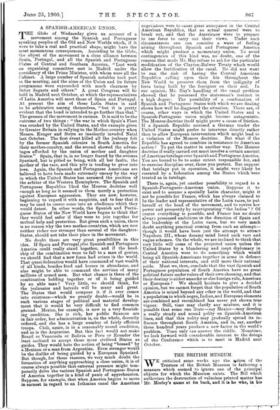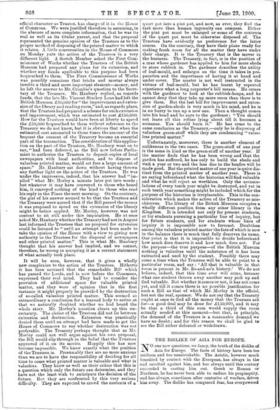THE BRITISH MUSEUM.
WE criticised some weeks ago the action of the Trustees of the British Museum in fathering a measure which seemed to ignore one of the principal objects for which the Museum exists. The Bill which authorises the destruction of valueless printed matter has Mr. Morley's same at its back, and it is he who, in his official character as Trustee, has charge of it in the House of Commons. We were justified therefore in assuming, in the absence of more complete information, that he was its real as well as its titular parent, and that the proposal represented the genuine opinion of the Trustees as to the proper method of disposing of the printed matter to which it relates. A little conversation in the House of Commons on Monday puts the action of the Trustees in a very different light. A Scotch Member asked the First Com- missioner of Works whether the Trustees of the British Museum had prepared any plans for its extension, and whether any funds applicable to this purpose had been bequeathed to them. The First Commissioner of Works was possibly conscious that bricks and mortar always involve a third and more important element—money, and he left the answer to Mr. Crombie's question to the Secre- tary of the Treasury. Mr. Hanbury replied, as regards funds, that the late Mr. Vincent Stuckey Lean had left the British Museum £50,000 for" the improvement and exten- sion of the library and reading room," and, as regards plans, that the Trustees had prepared a scheme for such extension and improvement, which was estimated to cost £150,000. How far the Trustees would have been at liberty to spend the £50,000 bequeathed to them without reference to the Treasury we do not know, but it is obvious that when the estimated cost amounted to three times the amount of the bequest the consent of the Treasury became an essential part of the transaction. The consideration of this applica- tion on the part of the Trustees, Mr. Hanbury went on to say, " had been deferred, as the Bill now before Parlia- ment to authorise the Trustees to deposit copies of local newspapers with local authorities, and to dispose of valueless printed matter, would set free a large amount of space." Mr. Hanbury sat down without having thrown any further light on the action of the Trustees. He was under the impression, indeed, that his answer bad " im- plied " what Mr. Morley a minute later put into words ; but whatever it may have conveyed to those who heard him, it conveyed nothing of the kind to those who read his reply in the Times the next morning. On the contrary, the gist of his answer seemed to be that the Trustees and the Treasury were agreed that if the Bill passed the money it was proposed to spend on the extension of the library might be better applied. Mr. Morley, however, was not content to sit still under this imputation. He at once asked Mr. Hanbury whether the Treasury had not in August last informed the Trustees that no proposal for extension could be listened to " until an attempt had been made to take the opinion of the House with a view to giving new authority to the Trustees for the disposal of newspapers and other printed matter." This is what Mr. Hanbury thought that his answer had implied, and we cannot, therefore, be wrong in accepting it as a correct statement of what actually took place.
It will be seen, however, that it gives a wholly new complexion to the action of the Trustees. Hitherto it has been assumed that the remarkable Bill which has passed the Lords, and is now before the Commons, expressed their real mind. They had to consider the provision of additional space for valuable printed matter, and they were of opinion that in the first instance it might properly be provided by the destruction of so-called valueless printed matter. This seemed so extraordinary a conclusion for a learned body to arrive at that we naturally doubted whether we bad heard the whole story. Mr. Morley's question clears up this un- certainty. The choice of the Trustees did not lie between extension and destruction. Extension was practically denied them until an attempt had been made to get the House of Commons to say whether destruction was not preferable. The Treasury perhaps thought that as Mr. Morley could not well argue against his own proposal, the Bill would slip through in the belief that the Trustees approved of it on its merits. Happily this has now become impossible. We know exactly what the position of the Trustees is. Presumably they are no more anxious tban we are to have the responsibility of deciding for all time to come what printed matter is valuable and what is valueless. They know as well as their critics that this is a. question which only the future can determine, and they have not the least wish to anticipate the decision of the future. But they are confronted by this very serious difficulty. They are expected to crowd the contents of a quart pot into a pint pot, and now, as ever, they find the task more than human ingenuity can compass. Either the pint pot must be enlarged or some of the contents of the quart pot must be otherwise disposed of. The Trustees have evidently no preference for the latter course. On the contrary, they have their plans ready for making fresh room for all the matter they have under their charge. It is the Treasury that is the mover in the business. The Treasury, in fact, is in the position of a man whose gardener has applied to him for more sheds to store rubbish in. The gardener describes the utility of leaf-mould, and enlarges on the time it takes in pre- paration and the importance of having it at hand and under cover. The master is not well instructed in the virtues of leaf-mould, but he has learnt by repeated experience what a long carpenter's bill means. He comes with the gardener to look at the rubbish-heaps, and he cannot deny that they take up more room than there is to give them. But the last bill for improvement and exten- sion of garden-sheds is very much in his mind, and he is in no hurry to run up a new one. Then a thought comes into his head and he says to the gardener : "You should not leave all this refuse lying about till it becomes a nuisance. You should burn it." He has come to the same conclusion as the Treasury,—only he is disposing of valueless green-stuff while they ale condemning " value- less printed matter."
Unfortunately, moreover, there is another element of unlikeness in the two cases. The green-stuff of one year is the same in kind as the green-stuff of another year. If the master finds that he has been wrong and that the garden has suffered, he has only to build the sheds and wait a year or two and the loss due to the bonfire will be made good. But the printed matter of one year is quite dis- tinct from the printed matter of another year. There is no saying beforehand what the historian will find valuable and what he will reject as worthless. Only the accumu- lations of every tenth year might be destroyed, and yet in each tenth year something might be included which for the purpose of the historian is irreplaceable. This is the con- sideration which makes the action of the Treasury so mis- chievous. The library of the British Museum occupies a wholly different position from any other library in the Kingdom. It is intended not only for present students, or for students pursuing a particular line of inquiry, but for future students, and for students whose lines of inquiry it is impossible now to forecast. Doubtless among the valueless printed matter the fate of which is now in the balance there is much that fully deserves its name. Our point is that it is impossible to decide beforehand how much does deserve it and how much does not. For the purpose—the true purpose—of the British Museum nothing is valueless until the substance of it has been extracted and used by the student. Possibly there may come a time when the Trustees will be able to point to a particular room, and say : All that is valuable in that room is present in Mr. So-and-so's history.' We do not believe, indeed, that this time ever will come, because what one student throws away another may pick up and find valuable. But whether it comes or not, it has not come yet, and till it comes there is no possible justification for such a Bill as that of which Mr. Morley is the official, but not the real, sponsor. We do not say that the Treasury ought at once to find all the money that the Trustees ask for—a good deal may be done for £150,000, and it may be that a third of this sum would supply the room actually needed at this moment—but that, in principle, the demand of the Trustees is a reasonable demand we have no doubt; and for this reason we shall be glad to see the Bill either defeated or withdrawn.



































 Previous page
Previous page